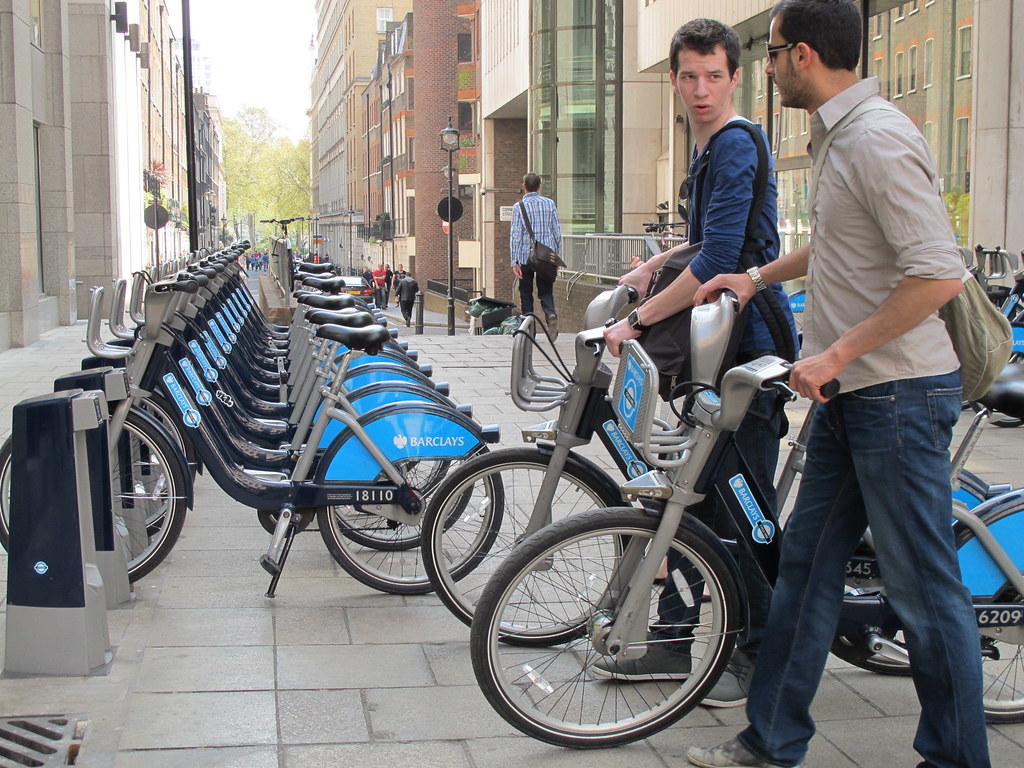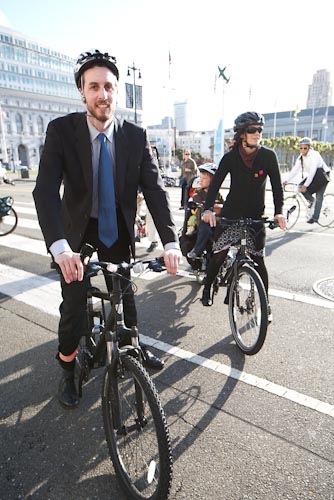
While San Franciscans eagerly await the repeatedly-delayed launch of the Bay Area's small-scale bike-share pilot program, which has now been downsized to a minuscule 700 bikes (350 of them in SF), Supervisor Scott Wiener says San Francisco needs to take the initiative to move ahead and launch a "full-scale system" throughout the city by next year.
Wiener plans to introduce a resolution [PDF] at today's Board of Supervisors meeting calling on the SF Municipal Transportation Agency to move beyond the pilot being planned by the Bay Area Air Quality Management District and launch a citywide bike-share system by 2014. American cities including New York, Chicago, Portland, and Los Angeles are all expected to launch their respective systems by then.

"All over the world, cities are recognizing the tremendous value of city-wide bike-share programs in reducing traffic, improving public transit and stimulating the local economy," Wiener said in a statement. "Here in San Francisco, we should be doing everything we can to establish and start reaping the benefits from a full-scale bike share program."
Bike-share, which the SFMTA has called one of the most cost-effective ways to increase bike ridership, was originally promised to launch in the spring of 2012 in five cities along the Peninsula, from San Francisco to San Jose. However, the BAAQMD has delayed the 1,000-bike pilot program, citing the general complexity of coordinating a regional system between five municipalities.
Karen Schkolnick, the BAAQMD's grant programs manager, said the current launch date is set for this August, and that the pilot will initially only include 700 bikes, though the agency expects to deliver the full 1,000 bikes within the following six months. The reason, she said, is that the $7,000,000 program won't be adequate to provide the 1,000-bike system as originally thought, and the agency hopes to get more funding from private sponsors with the initial 700-bike launch. "Basically, we used local funding to seed it," she said.
Ultimately, said Schkolnick, the BAAQMD hopes the system will sustain itself on sponsorship funds and membership fees, and expand to the East Bay with as many as 10,000 bikes. But Wiener said he wants to make sure "we're not just, in the future, waiting on the Air Board. I believe we should be pushing forward with our own expansion."
"We know what we need here, and we need a lot more bike-sharing," he said.
The SF Bicycle Coalition is "fully behind" Wiener's call, said Deputy Director Kit Hodge. "San Francisco is ripe for the opportunity -- [bike-share] is a job creator, it connects the city for huge numbers of people and opens up bicycling for everyone, and we're very excited about that," she said. "Other cities are showing that to get going, it doesn't have to be fully regional right away. We can start in San Francisco and build from there."
In a statement, SFMTA Director of Transportation Ed Reiskin said the agency is "excited to move forward with the first phase of our bike-sharing program this summer," but didn't indicate whether or not it might try to expedite the full-scale launch.
Schkolnick said the BAAQMD also plans to launch a request for sponsorships by next week, and that the bike-share system will likely carry the name of that sponsor, as has been done with London's Barclays Cycle Hire and New York's Citi Bike, a system set to launch in May with 5,500 bikes and expand to 10,000 in 2014, fully underwritten by private funding.
Hodge said that while there may be pros and cons to relying on sponsorship funding, "If we have an opportunity to move forward on a project like this, it would be really transformative for the city."
In London, Wiener said he's witnessed how "wildly successful" bike-share is, with heavy demand often leaving stations nearly empty of bikes. "London is a city where people drive, and they also use transit and bike, so it's a good model," he said.
A news release from Wiener's office cited stats showing the impacts that bike-share systems in Paris and Hangzhou, China have had on car traffic:
The Velib system in Paris, which consists of over 20,000 bikes and 1,800 stations, reduced traffic in the city by 5% in its first year. A March 2010 study found that in Hangzhou, where there are over 60,000 bikes in the program, 78% of car owners used bike share for trips previously taken by car.
"To be a true transit-first city, you have to give people as many viable alternatives as possible," said Wiener. "If we want to increase biking in the city, a robust bike-share program is a critical element of that."




